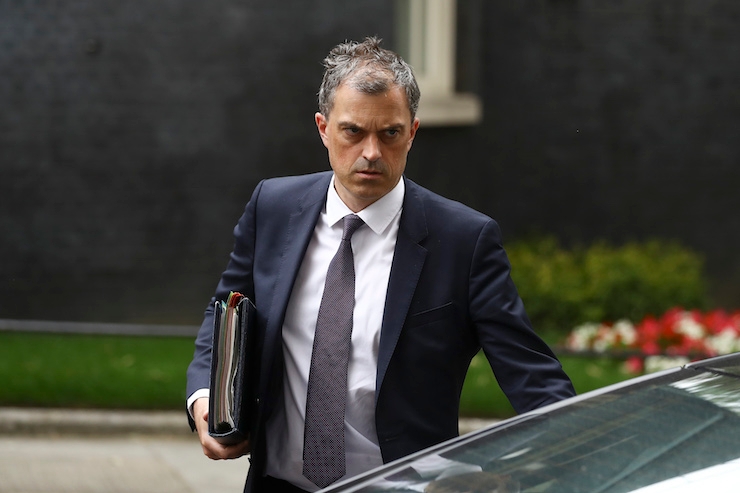Theresa May’s defence of Julian Smith this afternoon hasn’t gone down amazingly well. The Prime Minister stuck to the line that Smith’s instruction to Brandon Lewis to ignore the pairing arrangement he had with Lib Dem Jo Swinson and vote on two key Brexit divisions was an ‘honest mistake’. This seemed somewhat implausible before the Times reported that Smith had in fact asked other paired Tory MPs to vote, and that he had also admitted to a chief whip from another party that he had instructed Lewis to vote. But the Tories now look dangerously as though they are sticking to a lie. Of course, this being politics, Labour has accused the Prime Minister of offering ‘blatantly untrue excuses’ rather than the straightforward word ‘lying’. But the suggestion of outright dishonesty is still a stark one.
If Smith does remain chief whip, he will have been seriously weakened by this row. Whipping is about tricks and arm-twisting and threats and all the other stereotypical methods for getting recalcitrant MPs into the right voting lobby. But it’s also about trust. Parliamentary business and matters such as pairing MPs who are sick, pregnant or clutching a newborn infant depends on trust between the different parties. That relationship of trust is now damaged, and so is the relationship between the chief whip and his own flock. How can he ask MPs to trust him that they need to come back into Parliament for a certain vote? Or that pairing is indeed formally suspended for something? Or that when he offers them something in exchange for staying loyal to the government, he will make good on that promise?
These are serious questions for the Tories internally. They may be sticking by Smith because to lose a chief whip who is largely believed to be effective and businesslike would pitch the government into even deeper turmoil than has become the norm over the past few weeks. But they may also have taken the calculation that while the row in Westminster is particularly furious because it involves someone appearing to lie, the impact on the wider public will be far less striking.
There is a deep chasm between the public’s perception of how often politicians lie, and the approach to dishonesty within Parliament. An Ipsos Mori poll in 2016 found that just 21 per cent of voters would expect an MP to tell the truth. And the public has always held politicians in low esteem. The stereotype of an MP is one who lies.
Conversely, political culture actually tends to avoid outright lying. There are all sorts of formulations of not-lying that enable a politician or adviser to do this – ‘I don’t recognise this’, ‘I haven’t seen that’ being just two phrases that anyone who cannot truthfully say ‘this didn’t happen’ will deploy. Rob Hutton covers the art of political lying in his book ‘Would They Lie To You?’, and it’s an invaluable guide for anyone trying to translate political speech. Rob discussed these devices with Damian McBride, former Labour spin doctor who knew a thing or two about not-lying, on an episode of Week in Westminster a little while ago.
This guide to not-lying is especially handy for those who are new to Westminster, as a common SW1 coming-of-age moment is when someone realises that they were not-lied to on a story, for instance. That feeling of confusion, of realising that ‘I haven’t seen that’ wasn’t actually someone telling you clearly that the row you’d heard about didn’t actually happen, is a particular rite of passage for novice lobby reporters. But generally we accept that politicians and their advisers rarely actually lie. That’s why Donald Trump has discombobulated the political establishment so much: he doesn’t do the formulaic not-lying stuff that everyone else has grown very used to.
But for all this clever language, while politicians may honestly be able to say that they do not actually lie very often, they are still obfuscating the truth about what they are up to. And that’s why the public perception of Westminster as being a lying factory may not be as far off as it seems: if you break your word or you issue a non-denial denial about something that really did happen, then you’re still not being truthful.







Comments